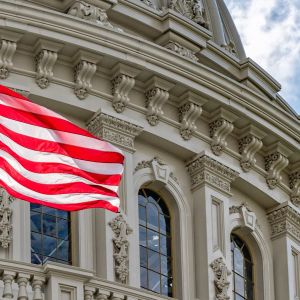The U.S. House Financial Services Committee has passed the Anti-CBDC Surveillance State Act (H.R. 1919), which House Majority Whip Tom Emmer reintroduced . The law seeks to stop the U.S. government from using central bank digital currencies (CBDCs) for monetary policy. It also aims to stop Federal Reserve banks from offering services directly to individuals. Emmer believes this bill will protect financial privacy and individual freedom from potential government surveillance. The bill has sparked a debate between those concerned about privacy and government surveillance and those who see CBDCs as vital for the future of payments. What Does the Bill Do? The bill passed the voting session on Wednesday with 27 votes in favor and 22 against. Tom Emmer, the bill’s sponsor, said it ensures that the American people, not government agencies, make digital currency decisions. Central bank digital currencies are digital forms of money issued by a country’s central bank. Supporters say CBDCs could make payments faster, cheaper, and more efficient. Emmer called CBDCs “government-controlled programmable money.” He expressed concerns that CBDCs could be used to monitor people’s transactions and control their spending. The bill aims to prevent this by keeping financial freedom intact. The committee also passed another bill called the Stablecoin Transparency and Accountability for a Better Ledger Economy. This bill aims to create rules for stablecoins linked to the U.S. dollar, which is meant to help stablecoins grow safely and transparently. CBDCs Gets Widespread Adoption Many countries around the world are exploring CBDCs. The Atlantic Council recently reported that 134 countries, representing 98% of global GDP, are considering or developing the program. Some of these countries are already in the advanced stages of planning. In contrast, the U.S. and Norway are taking a more careful approach. President Donald Trump’s Executive Order issued in January protects citizens from the risks of CBDCs. Federal Reserve Chairman Jerome Powell and U.S. Treasury Secretary Scott Bessent shared the same sentiment. They said that they do not see a need for a CBDC in the U.S. at the moment. Anti-CBDC Bill Sparks Criticism Some lawmakers argue that banning CBDCs could cause the U.S. to fall behind in the global economy. Rep. Maxine Waters, a Democratic leader, believes banning CBDCs would hurt the U.S. dollar’s global position and prevent the country from developing new payment systems. Meanwhile, the Official Monetary and Financial Institutions Forum (OMFIF) Future of Payments 2024 survey revealed that central banks are shifting to instant payment systems over CBDCs. The post U.S. House Committee Approves Anti-CBDC Surveillance Bill appeared first on TheCoinrise.com .














